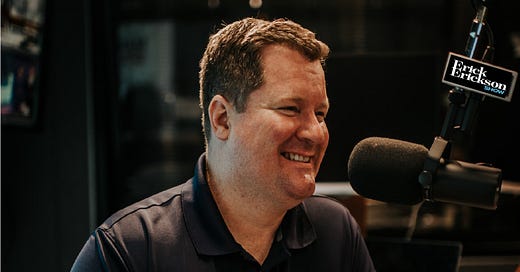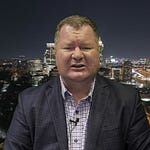Joshua Youssef, President of Help The Persecuted, joined me on radio to share what his team is doing in Afghanistan. You can help Joshua and his team here. They have 200 families they are trying to get out of Afghanistan. Even though the US government has given up, Help the Persecuted has not. But they need your help.
This is the transcript from the interview.
Erick:
Joining me by phone, an organization I talk about a lot has help the persecuted around the world. They help particularly persecuted Christians escape persecution. They've been active in Afghanistan, and joining me is the head of Help the Persecuted, my friend, Josh Youssef. Josh, how are you?
Josh Youssef:
I'm tired, Erick, but I'm glad to be on with you.
Erick:
Yeah, well, I bet you're tired. You've had a busy couple of weeks. And if you would just tell people about what you've gone through these last couple of weeks.
Josh Youssef:
We got word that the Taliban had taken over Kabul last week and the week previous, and our field team began mobilizing and trying to get out of Kabul airport and just were unsuccessful. We tried all sorts of ways to get them out. It's about 150 staff with families, could not get them out Kabul airport. And they ended up heading a different direction. And in that time from heading to Kabul airport to this other location, some of them decided, you know what? We're going to stay back and we're going to stay back and help more people escape. So we're moving some of the team out of the country, those that are more vulnerable or what we call higher value targets, HPTs. And then we're keeping a core group of people in country to help others get out either by ground or by air.
Erick:
Gosh, so I mean, how many people do you have behind?
Josh Youssef:
Right? Currently, still 150 staff with families. You're probably looking at about 300 when you add in all their family members. We'll keep a skeleton crew back. Right now, we've identified about 500 in what we call MBBs, Muslim background believers. So converts from Islam, 500 families that want to get out. Our core team will remain on ground to do what we think is about another week left of air movement, not from Kabul, from a different location. And then another part of our project is a longer term project where we think that number will grow to about a thousand convert families that we're looking at more long-term solutions to keep them in country. And over time, onesies and twosies, as we say, getting them out of the country.
Erick:
And I know you do this, not just in Afghanistan. How does Help the Persecuted help those in country avoid capture, torture, death? How do you protect them?
Josh Youssef:
Right now, we're looking at funds in through a system, a fund distribution there, and then we're also topping up their cell phones ... top up their cards in order for them to be able to keep communicating. And then also working on, like I said, the next probably seven days, we think we've got some air movement where we can actually get some of these people out. The ones that stay, we're using a specific banking system to be able to get funds to them, those that stay behind.
Erick:
I know you can't reveal everything that you guys do, but what goes into building a network of people willing to help inside a country like Afghanistan or Iraq for that matter?
Josh Youssef:
In this case, my number two, and he's really my partner in this ministry, he had spent a lot of time in Afghanistan. He was one of the first ones in with the troops after 9/11. And he had a partnership with an organization that had all these staff. These staff are now part of our team on the ground, and those are the ones I'm referring to. They were doing great work. For the last 20 years, they worked women empowerment and schools, preschools, all sorts of agricultural projects. They were working with the U.S. government, USAID and others to partner to do this.
Josh Youssef:
And this is the thing, Erick. I mean, these people work for government agencies and they were just left, and that makes them a target. They are what we call HVTs, high value targets, because of what they were doing to help Americans and national Afghan forces, which is in a sense, a lot of it was in counter to what the Taliban wanted to be seen. And so, they're at great risk.
Erick:
Yeah. And I mean, obviously prayer is something that all of us should be doing in situations like this, but with them being at risk, I mean, what real-world things do you guys try to do on the ground with them and for them?
Josh Youssef:
Yeah. So in most cases, we look at emergency relief kits that are in ... that's what we do primarily in the middle east. And again, in this case, it's going to be safe housing, topping up their cell phone cards, and then getting funds to them to sustain them. That's the longterm goal that we have in this project.
Erick:
Now, okay. Let's talk real world. Once you get someone out of the country, what happens? Where do they go? What do you do?
Josh Youssef:
It's really complicated right now, but if they have an SIV or a P2 or [inaudible 00:05:48] a U.S. passport or green card, we can pretty much get them to a holding facility in Doha or in Rammstein, in Germany, and then they get processed. Now, the state department has not been helpful here, I mean, super unhelpful here. I cannot state that more emphatically. They have changed the bar and moved the bar so many times. And we keep hearing from even other nations, members of parliament of other nations saying to us, Hey, your government does not want this. They do not want these people moving. They're trying to put a lid on this so that it ... I don't know if they don't want the optics of it or what the political reason is, but they have created this huge mess. And then they're just trying to push this lid down and keep all these people in.
Josh Youssef:
So if we can't get them into these facilities, sometimes these facilities will run at 150% capacity in Doha and Germany, there are other countries that we're talking to you right now about taking them. Hungary, for instance, where we're in conversations with the Hungarian government, wonderful people. And they're weighing this up and other nations are starting to say, Hey, we'll take them. So those are possibilities too. If we can get them to neighboring countries or way station countries, we might be able to get them to these long-term countries other than the United States as well.
Erick:
Well, that's refreshing at least, but now let's step out of Afghanistan, because Help the Persecuted ... And for those of you just tuning in, I'm talking to Josh Youssef who runs Help the Persecuted. And Josh, you don't just focus on Afghanistan. You've got a lot of people involved across the middle east in this mission. Talk to me about that a little bit.
Josh Youssef:
Yeah. So we have staff stretched from Morocco all the way to almost the Iranian border, and handling some of the Iranian cases coming into other countries. They respond to cases of persecution, imprisonment, what we call civic death. That's where communities, families take away driver's license, passport, the ability for someone to earn a living. And they begin to stranglehold that person to get them to come back to Islam. So our teams will come in. We've done some evacuations in some cases, safe housing, we've paid for lawyer's bills. We pay for airline tickets, bus tickets. We've done loans to help people get a business started in a community where they're not encouraged to earn a living and be independent. So we sometimes have to move them from one town to the other, or sometimes from one Arab state to another Arab state where they can take on a new identity.
Erick:
Gosh, and I know back in June, you guys were trying to get out of Iraq, someone who was actually descended from the prophet Muhammad.
Josh Youssef:
That's right. Yeah, two men from Northern Iraq and we got them out. They're in another country right now. And it was one of those moments for us where it was touch and go. We didn't think we'd be able to get them out, but we did. And God's really doing amazing things in their lives that one of them is even considering seminary and Bible college. And it's going to be awesome to see what God does to use him in a way that reaches his population for the gospel for Jesus.
Erick:
Let's talk about you in this, because you and I met in seminary. Your dad, Michael, is the senior pastor at Church of the Apostles. And what got you into particularly helping the persecuted church around the world. I mean, why is this mission for you?
Josh Youssef:
9/11 was a seminal moment for me. And I realized at that moment that this was not going to be a war necessarily won by bombs and guns and on a battlefield, but on a spiritual level. And so I became really just touched by these MBBs, these Muslim background believers, and what they would share with me in terms of ... I know you and I went to a reform seminary that didn't know what box to put this in. But we were hearing about dreams and visions that these Muslims were having about Jesus. And these kinds of conversations for me were just ... they just uplifted me in such a way that I realized that this was the way that we were going to win this war against groups like ISIS and Taliban.
Josh Youssef:
And so I started in media ministry towards these people, and then became just really passionate about more of a ground game effort. How do we actually come alongside these people physically and actually present the gospel personally, but also walk them through their time of weakness. 9/11 was a big moment for me, and that's how I first got into this.
Erick:
Now, what is the biggest threat obviously to the individual terrorist groups, the Taliban and the like? But to Help The Persecutor, what's the biggest threat to an organization like you being able to fulfill your mission?
Josh Youssef:
Well, yeah. And to that end, we have had some safe houses broken into and raided. Having that breakdown of security is something that is a threat to us. We can't afford to have a safe house breached because of the ripple effect that it would have into the larger, broader MBB community. But yeah, that's probably the one that we worry about most is whether or not ... that our people are safe on the ground.
Erick:
Well, and circling back to Afghanistan now, with people on the ground and trying to get them out. The government, it looks like really in the last month or so has been rushing to get people out. When did you guys really put an effort into thinking you're going to have to start extracting people from Afghanistan?
Josh Youssef:
Yeah, it was really our partner who called and he said, Josh, we need your help because my guys are stuck. We don't have the money to fly them out. We don't have the resources, the political clout. And so we came together along with previous administration, White House administration officials, former CIA, former counter-terrorism people, former military guys, NGOs, former state department workers, so many people you knew really well, Erick, and we have been doing group meetings every day on zoom to discuss how we can solve this crisis and work together. And all the major players are on those calls. And that's how we got brought in, was really through our partner.
Josh Youssef:
And our partner has really become critical to this because of his having lived there for 20 years, his staff are super knowledgeable about the region and very, very capable people. And so I just feel ... I was humbled when they said some of us are going to stay back and we're going to help. So, that has put us in a position to really serve a lot more people than what we thought we were going to do when we initially looked at this operation.
Erick:
Now, last thing for you before you get off here. Tell me just a little bit about the ... I can hear it in your voice, the weariness, the toll this has taken on you right now.
Josh Youssef:
It's hard, Erick. I mean, I've got this girl calling me from Kabul and I sent you her voicemail. I mean, these people are saying, you have to save me, you have to help me. My dad is missing. My dad was taken by the Taliban. You have to get me out, and we're not sleeping. I mean, we're all sleeping a couple of hours here and there. We get up in the middle of night, we start working with evac teams and charter operators and contractors. But it's that voicemail that just propelled me and keeps driving me to help her. I've got a picture on my desk of a couple of girls that are the daughters of one of our key people on the ground. They're converts from Islam and that just drives me. It drives me all night and all day.
Erick:
Well, Josh, listen, I know it is grueling, and I could hear it in your voice without even having to ask you about that. And I appreciate the work you're doing. And for those of you listening, if you want to help, Help the Persecuted, if you text the word donate to 33777, you will get back a link from me. Josh set this up, so you guys will get credit for helping them track through that URL, and anything you can help. They got to raise some money to help keep getting people out of Afghanistan, in the middle east in general. And Josh, I sure appreciate the work you're doing. And legitimately just thank you so much for stopping by and doing what you're doing.
Josh Youssef:
Well, I'm grateful, Erick. You're my only friend that has an HDP URL, http.org/erick, E-R-I-C-K.
Erick:
Well, we will keep it going. Josh Youssef, thank you so much.
Josh Youssef:
Love you, man. Thank you.
Erick:
Thank you. Help the Persecuted is the organization from Morocco to Afghanistan. They're helping people in Afghanistan. They've still got to evacuate people, even though the U.S. government isn't. If you want to help, text the word donate to 33777. Every dollar goes to helping them evacuate people from Afghanistan right now. Text the word donate to 33777.













Share this post